英语虚拟语气讲解
英语虚拟语气讲解
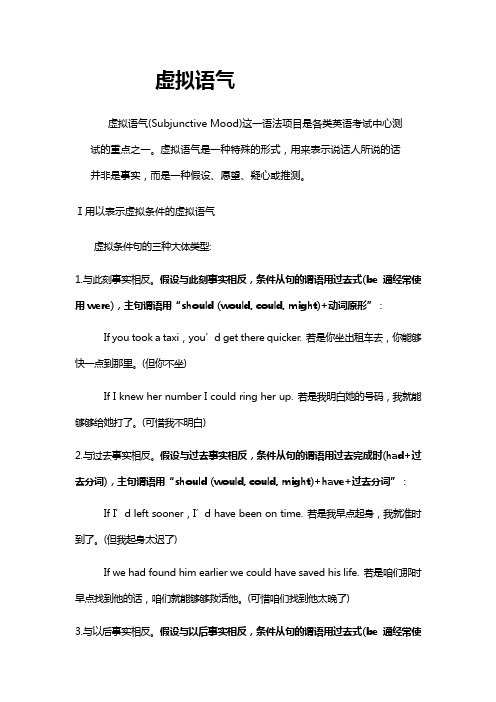
虚拟语气虚拟语气(Subjunctive Mood)这一语法项目是各类英语考试中心测试的重点之一。
虚拟语气是一种特殊的形式,用来表示说话人所说的话并非是事实,而是一种假设、愿望、疑心或推测。
Ⅰ用以表示虚拟条件的虚拟语气虚拟条件句的三种大体类型:1.与此刻事实相反。
假设与此刻事实相反,条件从句的谓语用过去式(be通经常使用were),主句谓语用“should (would, could, might)+动词原形”:If you took a taxi,you’d get there quicker. 若是你坐出租车去,你能够快一点到那里。
(但你不坐)If I knew her number I could ring her up. 若是我明白她的号码,我就能够够给她打了。
(可惜我不明白)2.与过去事实相反。
假设与过去事实相反,条件从句的谓语用过去完成时(had+过去分词),主句谓语用“should (would, could, might)+have+过去分词”:If I’d left sooner,I’d have been on time.若是我早点起身,我就准时到了。
(但我起身太迟了)If we had found him earlier we could have saved his life. 若是咱们那时早点找到他的话,咱们就能够够救活他。
(可惜咱们找到他太晚了)3.与以后事实相反。
假设与以后事实相反,条件从句的谓语用过去式(be通经常使用were),主句谓语用“should (would, could, might)+动词原形”:If he went,would you go too? 若是他去,你也去吗?(可能他可不能去) If I asked him,I’m sure he’d help us. 若是我向他提出要求,确信他会帮忙咱们。
(只是我不打算如此做)大多数的虚拟条件句属于上面三种情形的一种,但并非排除存在条件和后果中,一个和此刻情形相反,另一个和过去情形相反,例如:If you had followed what the doctor said, you would not have been so painful now.那个句子在高中显现频率颇高。
(完整版)英语虚拟语气语法归纳总结
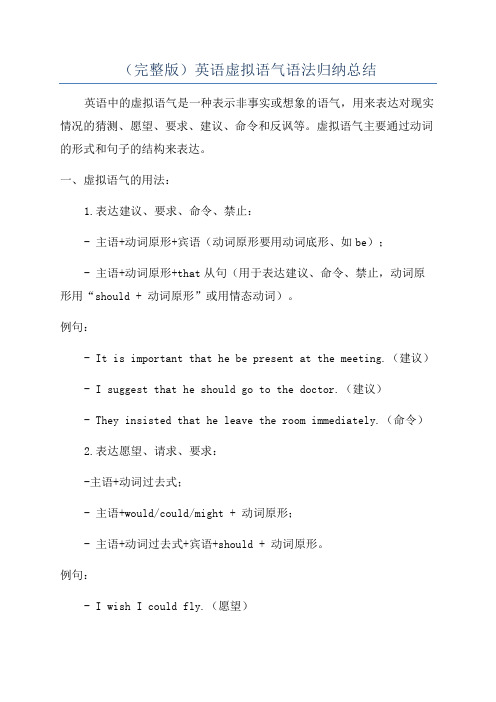
(完整版)英语虚拟语气语法归纳总结英语中的虚拟语气是一种表示非事实或想象的语气,用来表达对现实情况的猜测、愿望、要求、建议、命令和反讽等。
虚拟语气主要通过动词的形式和句子的结构来表达。
一、虚拟语气的用法:1.表达建议、要求、命令、禁止:- 主语+动词原形+宾语(动词原形要用动词底形、如be);- 主语+动词原形+that从句(用于表达建议、命令、禁止,动词原形用“should + 动词原形”或用情态动词)。
例句:- It is important that he be present at the meeting.(建议)- I suggest that he should go to the doctor.(建议)- They insisted that he leave the room immediately.(命令)2.表达愿望、请求、要求:-主语+动词过去式;- 主语+would/could/might + 动词原形;- 主语+动词过去式+宾语+should + 动词原形。
例句:- I wish I could fly.(愿望)- I would appreciate it if you could help me.(请求)3.表示虚拟条件:- If条件从句中的谓语动词用过去完成时,主句用would/should/might/could + have + 过去分词;- If条件从句中的谓语动词用过去时,主句用would/should/could + 动词原形。
例句:- If I had known his phone number, I would have called him.(虚拟条件)- If you had listened to me, we could have finished the project earlier.(虚拟条件)4.表达建议、要求、祝愿:- If only内部称述 + 主语 + 过去式。
英语语法 虚拟语气的知识点归纳
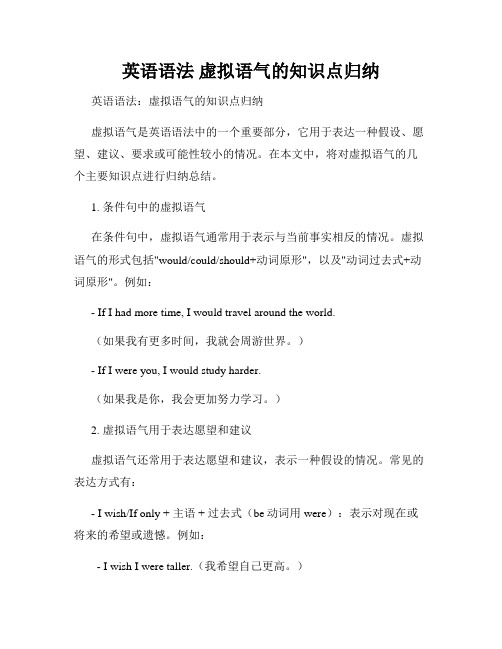
英语语法虚拟语气的知识点归纳英语语法:虚拟语气的知识点归纳虚拟语气是英语语法中的一个重要部分,它用于表达一种假设、愿望、建议、要求或可能性较小的情况。
在本文中,将对虚拟语气的几个主要知识点进行归纳总结。
1. 条件句中的虚拟语气在条件句中,虚拟语气通常用于表示与当前事实相反的情况。
虚拟语气的形式包括"would/could/should+动词原形",以及"动词过去式+动词原形"。
例如:- If I had more time, I would travel around the world.(如果我有更多时间,我就会周游世界。
)- If I were you, I would study harder.(如果我是你,我会更加努力学习。
)2. 虚拟语气用于表达愿望和建议虚拟语气还常用于表达愿望和建议,表示一种假设的情况。
常见的表达方式有:- I wish/If only + 主语 + 过去式(be动词用were):表示对现在或将来的希望或遗憾。
例如:- I wish I were taller.(我希望自己更高。
)- If only she could speak fluent English.(要是她能说一口流利的英语就好了。
)- It is time + 主语 + 过去式(should + 动词原形):用于表示现在或将来应该发生的动作。
例如:- It is time we started the meeting.(是时候开始会议了。
)- It is time you should apologize to her.(你应该向她道歉了。
)3. 虚拟语气在宾语从句中的使用在宾语从句中,若主句的动词表达了建议、命令、要求等含义时,宾语从句中的谓语动词常使用虚拟语气。
具体的用法如下:- 建议:suggest/recommend + (that) + 主语 + (should)+ 动词原形。
高中英语虚拟语气的用法归纳

高中英语虚拟语气的用法归纳以下是高中英语虚拟语气的用法归纳:虚拟语气是一种特殊的动词形式,表示假设、愿望、建议、命令、猜测等非真实的情况。
一、基本用法1. 与现在事实相反条件从句:If + 主语 + 动词过去式(be 动词用 were)主句:主语 + would/should/could/might + 动词原形例句:If I were you, I would study harder. (如果我是你,我会更努力学习。
)Wouldn't life be boring if we had everything we wanted? (如果我们想要什么就有什么,生活岂不是很无聊?)2. 与过去事实相反条件从句:If + 主语 + had + 过去分词主句:主语 + would/should/could/might + have + 过去分词例句:If I had known your phone number, I would have called you. (如果我知道你的电话号码,我就给你打电话了。
)Couldn't you have done better if you had tried harder? (如果你再努力些,难道不能做得更好吗?)3. 与将来事实相反条件从句:① If + 主语 + 动词过去式② If + 主语 + were to + 动词原形③ If + 主语 + should + 动词原形主句:主语 + would/should/could/might + 动词原形例句:If it rained tomorrow, we would stay at home. (如果明天下雨,我们就待在家里。
)If she were to come here tomorrow, I would be very happy. (如果她明天来这儿,我会非常高兴。
)If he should fail in the exam, how disappointed his parents would be!(要是他考试不及格,他父母该多失望啊!)二、固定搭配1. wish 后的宾语从句与现在事实相反:从句用一般过去时与过去事实相反:从句用过去完成时与将来事实相反:从句用 would/could + 动词原形例句:I wish I were as tall as you. (我希望我和你一样高。
英语语法讲解之——虚拟语气

虚拟语气:表示动作或状态不是客观存在的事实,而是说话人的主观愿望、假设或推测等。
If I were a bird, I could fly in the air. 如果我是一只小鸟,我就能在空中飞行。
I wish I could pass the examination. 我希望我能通过考试。
May you succeed! 祝您成功!I.状语从句中的虚拟语气一、虚拟语气在if 引导的条件句中的用法:1. 表示与现在事实相反的虚拟条件句。
其句子结构为:从句:If + 主语+ 动词的过去式(be 用were) + ……主句:主语+ would (should, could , might) + 动词原形+ ……If I were you, I would go with him. If the weather were fine, I would go there.If it weren’t snowing, we wouldn’t stay in the house.If it weren’t for your help, we would get into trouble.If they were here, he would be speaking to them now.2. 表示与过去事实相反的虚拟条件句。
其句子结构为:从句:If + 主语+ had +动词的过去分词+ ……主句:主语+ would (should, could, might) + have +动词的过去分词+……If you had taken my advice, you would not have made such a mistake.如果你听了我的劝告,就不会犯这样的错误。
If it hadn’t been for your help, I shouldn’t have finished this work on time.要是没有你们的帮忙,我就不会按时完成了这项工作。
英语虚拟语气知识点

英语虚拟语气知识点(经典版)编制人:__________________审核人:__________________审批人:__________________编制单位:__________________编制时间:____年____月____日序言下载提示:该文档是本店铺精心编制而成的,希望大家下载后,能够帮助大家解决实际问题。
文档下载后可定制修改,请根据实际需要进行调整和使用,谢谢!并且,本店铺为大家提供各种类型的经典范文,如演讲稿、总结报告、合同协议、方案大全、工作计划、学习计划、条据书信、致辞讲话、教学资料、作文大全、其他范文等等,想了解不同范文格式和写法,敬请关注!Download tips: This document is carefully compiled by this editor. I hope that after you download it, it can help you solve practical problems. The document can be customized and modified after downloading, please adjust and use it according to actual needs, thank you!In addition, this shop provides you with various types of classic sample essays, such as speech drafts, summary reports, contract agreements, project plans, work plans, study plans, letter letters, speeches, teaching materials, essays, other sample essays, etc. Want to know the format and writing of different sample essays, so stay tuned!英语虚拟语气知识点虚拟语气一般指说话人的主观愿望或假想,是与客观存在相反的事实,或在现实中无法成真的事情或情形。
初中英语知识点归纳虚拟语气的种类与用法
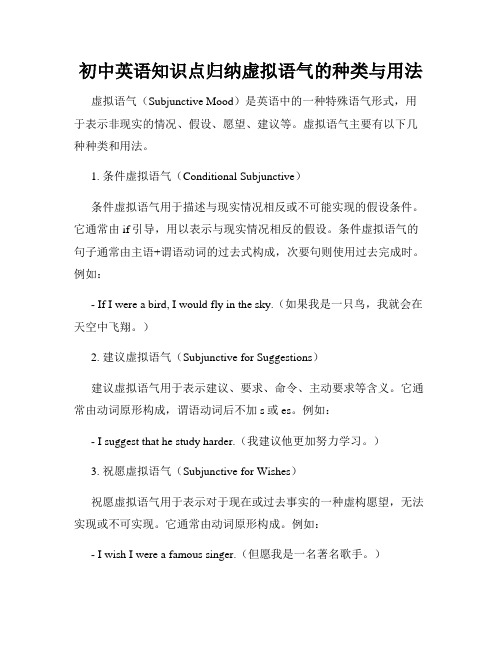
初中英语知识点归纳虚拟语气的种类与用法虚拟语气(Subjunctive Mood)是英语中的一种特殊语气形式,用于表示非现实的情况、假设、愿望、建议等。
虚拟语气主要有以下几种种类和用法。
1. 条件虚拟语气(Conditional Subjunctive)条件虚拟语气用于描述与现实情况相反或不可能实现的假设条件。
它通常由if引导,用以表示与现实情况相反的假设。
条件虚拟语气的句子通常由主语+谓语动词的过去式构成,次要句则使用过去完成时。
例如:- If I were a bird, I would fly in the sky.(如果我是一只鸟,我就会在天空中飞翔。
)2. 建议虚拟语气(Subjunctive for Suggestions)建议虚拟语气用于表示建议、要求、命令、主动要求等含义。
它通常由动词原形构成,谓语动词后不加s或es。
例如:- I suggest that he study harder.(我建议他更加努力学习。
)3. 祝愿虚拟语气(Subjunctive for Wishes)祝愿虚拟语气用于表示对于现在或过去事实的一种虚构愿望,无法实现或不可实现。
它通常由动词原形构成。
例如:- I wish I were a famous singer.(但愿我是一名著名歌手。
)4. 委婉语气(Subjunctive for Politeness)委婉语气用于表示礼貌、客气、委婉的说法,常用于祈使句、建议句、感谢句等。
它通常由动词原形构成。
例如:- Would you mind closing the window?(您介意关上窗户吗?)5. 愿望虚拟语气(Subjunctive for Desires)愿望虚拟语气用于表示对于将来可能的愿望,但很少说成真的可能性。
它通常由动词原形构成,常与情态动词“would”连用。
例如:- I hope she would come to my party.(我希望她能来参加我的派对。
高中英语语法讲解——虚拟语气
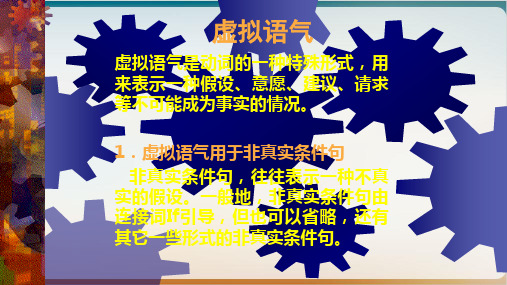
2.这类主语从句常常用于表示要求、建议、 命令、请求、提议等,其谓语形式往往为 “ ( should)+ 动 词 原 形 ” 的 形 式 。 在 美 国,常省略should,而在英国,则往往不 省略should。
比如:
--It is necessary that the machine (should) be oiled everyday. 机器必须天天上油。
1.1.1.和现在事实相反的非真实条件句
这类非真实条件句表示和现在事实相反的情况。比如: --I would/should certainly go if I had the time.
如果我有时间,我一定会去的。 --If I were your father, I would criticize you more
--I never expected that the problem should be so complicated.
我从未想到问题会如此复杂。
--They just couldn’t believe that the new stadium should be so big.
他们简直不能相信新的体育馆会如此大。
--The teacher insisted that all the students (should) be on time.
老师要求学生们准时到校。
--He suggested that the regulations (should) be revised. 他建议修改规则。
The lawyer asked that the case (should ) be postponed for one month. 律师要求案子往后推迟一个月。
- 1、下载文档前请自行甄别文档内容的完整性,平台不提供额外的编辑、内容补充、找答案等附加服务。
- 2、"仅部分预览"的文档,不可在线预览部分如存在完整性等问题,可反馈申请退款(可完整预览的文档不适用该条件!)。
- 3、如文档侵犯您的权益,请联系客服反馈,我们会尽快为您处理(人工客服工作时间:9:00-18:30)。
1 语气概述 在英语中,随着说话人对某一行为或事情的看法和 态度不同,谓语动词就用不同的形式,即称为语 气。英语语气有三种:陈述语气,祈使语气和虚 拟语气。 虚拟语气表示只存在于讲话人想象中的假设或推测, 而不是客观现实中的真实事件。它表示怀疑、忧 虑、推测、假设、想象或祝愿等,如
ห้องสมุดไป่ตู้
I wish you were more careful. If I were not so busy, I would go and help him.
3. 虚拟语气在条件从句中和结果主句中的用法 (1)与现在事实相反时 1. I’m very busy now. If I had time, I would certainly go to the movies with you. 我很忙, 如果我有时间,我就当然会与你一起去看电影。(事实上我没 有时间,也不能与你一起看电影) 2. If I were you, I should go and see the dentist at once. 如果我是你,我就马上去看牙医。(事实上我不是你,也不会去看牙医) 3. If there were no gravity, we should not be able to walk. 如果没有引力,我们就不能走路。(事实上有引力,我们也能走路。)
2 虚拟语气在虚拟条件句与结果主句中的谓语动词 形式。 条件句中的 结果主句中的 谓语动词 谓语动词
与现在事实相反 动词过去式 ( be用were) had+过去分词
should/would could/might+动词原形 should/would/could might+have+过去分词
与过去事实相反 与将来事实可能 相反
(2)与过去事实相反 1. If you had come a few minutes earlier, you would have met her. 如果你早来几分钟,就会见到她了。(事实上没有早来,也 没有见到她) 2. If I hadn’t taken your advice, I would have made a big mistake. (3) 与将来事实可能相反 1. If it were Sunday tomorrow, I would go to see my friend there. 2. If I should do it, I would do it another way. 3. If I were to see him, I would speak to him about it. 4. I I dropped the glass, it would break.
动词过去式 should+动词原形 were+动词原形
should/would/could/ might+动词原形
注意:1主句中的should通常用于第一人称,would可用 于各种人称。根据意义上的需要可用情态动词could,might 代替should,would. 2 条件从句中如果谓语动词是be,其过去式所有人称 的单复数都用were,但在口语中,第一人称和第三人称单数 可用was代替were.但在if I were you中,必须用were,不 能用was代替。
7 虚拟语气的其它用法 (1)在主语从句中的用法 在这类句型里,that 所引导的主语从句的谓语动词,常用 should+动词原形,should 可省去,但不换为would。 主句里谓语动词时态不限,这类句型常用一下三种形式:
A. It is /was +形容词+that…适用于这一句型的常用形容 词有: necessary, important, natural, strange, imperative, urgent, essential, probable, better, keen, possible, eager, anxious, unthinkable, astonishing等 It is necessary that the question (should) be settled at once. It seems incredible that he should have finished the work so soon. It was quite natural that he should think so.
5 混合虚拟条件句 如果虚拟条件句与结果主语的动作发生的时间不一致,主从 句的谓语动词就要根据各自动作发生的时间选用相应的虚 拟语气形式,如 If he had followed the doctor’s advice, he would be quite all right now. 他若当时听医生的话,他现在就痊愈了。 Had I taken my umbrella with me when I came out this morning, I should not be wet now. 如果我早上出来时带了伞, 现在就不会淋湿了。
4 省掉if 的条件从句结构 在书面语中,有时可不用连词if,而把were,had 或 should 移到主语前,形成没有if 的条件从句,其 意义不变。 If you had invited us, we should have come to your party. Had you invited us, we should have come to your party. Had you invited us, we would have come to your party.
6 含蓄虚拟条件句 有时虚拟语气不用条件从句,而是通过上下文或用介词短语 等表示出来,这种虚拟语气叫含蓄 虚拟条件句,如 The gifts to him would have filled a railroad freight car .(货车) I couldn’t have lived through Christmas without giving you a present. Bur for the leadership of the party, we would not live a happy life today. Man would die without air and water.
